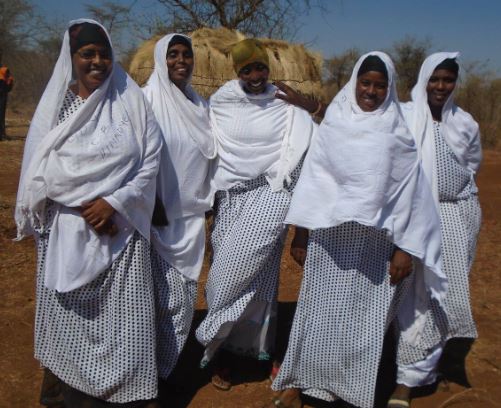
There is no better way to revitalize and promote cultural heritage and cultural rights; transmit indigenous knowledge and build peace than through innovative artistic expressions and explorations. The Guyasa CBO embarked on this endeavour and reaped valuable results in Isiolo, in northern Kenya, particularly in Kinna community which is mainly occupied by the pastoralist Waso Borana. The customary institution and traditional governance system called Dee’da is composed of elders, and youth and women representatives who mandated to oversee resource management and governance in the community.
The project was made possible through the participation of the entire community who were encouraged and made to understand their role at different stages in the project implementation. Community elders as the custodians of traditional knowledge and as key decision makers were involved in almost all the learning processes through the Dedha traditional resource and culture preservation. They educated the younger generations during their gatherings to discuss community resource management issues, such as using and making traditional milk and meat containers to enhance food production and preservation. Women in their homes teach the mother tongue to their children once they start talking for them to understand their own indigenous language. Youths are expected to learn traditional knowledge from elders during school holidays.
Local singers, story tellers, poets and orators among the women, men, and youth of the Waso contemporary art performance were engaged to share their talents and experiences with children and other disadvantaged groups like people with disabilities and those living with HIV Aids. Ceremonial and traditional songs and dances for children-naming and livestock-raising were taught, practiced and publicly performed which enhanced knowledge transmission from the older generation to the youth and children. The entire exchange and transmission of indigenous knowledge was documented for reference of future generations.
Selected students in Kinna schools learned how to play guitar and perform the hybrid waso boran cultural/contemporary music. To inspire and challenge the youth, a competition for students from different schools was organized enabling them to learn more of their music and their own creative process.
Community members who possessed acting and dramatic skills further honed their talents by dramatizing ceremonies on child naming, weddings and other milestones and transitional markers, in the process, transmitting knowledge. Children then learned the traditional way of doing all these cultural events while acquiring acting and dramatic skills. Composing timely pieces through music and drama and publicly performing these to the community conveyed the youth’s grasp of the multi-faceted concepts of their cultural practice and the need to preserve this. Showcasing these in public performances and functions including festivals provided an opportunity for diverse communities to come together, share cultural experiences and promote harmonious co-existence.
The children were also taught carving, blacksmithing, pottery and molding to enable them to learn and gain skills in traditional crafts.
The elder men and women shared with the youth and children how to play and perform traditional games and sports such as the race Qorassumo which is usually played at night by children as part of a healthy lifestyle.
Tapping local talents and experts to protect and revitalize traditional knowledge through preservation and documentation was a great feat, despite the challenges. Teaching and transmitting traditional knowledge, and documenting and archiving for future generations, are huge tasks for the custodians of such knowledge.
While some community members were sceptical about the project for some cultural reasons such as differing views on retrogressive cultural practices, the results proved otherwise. The vibrant and enthusiastic participation of all community sectors illustrated a sense of acceptance and ownership. The active participation of the youth to learn their rich culture held so much promise.
The success and sustainability of the project rested on the community’s desire to nurture their culture and its perpetuity through the next generation. The willingness of culture and knowledge bearers to share their knowledge and skills was key to this exchange and transmission.
GUYASA CBO implemented the project “Revitalizing and Promoting Cultural Heritage, Cultural Rights, Indigenous Knowledge Transmission, Entertainment and Peace-building through Innovative Artistic Expressions and Explorations” in December 2017 with the support of PAWANKA Fund.
